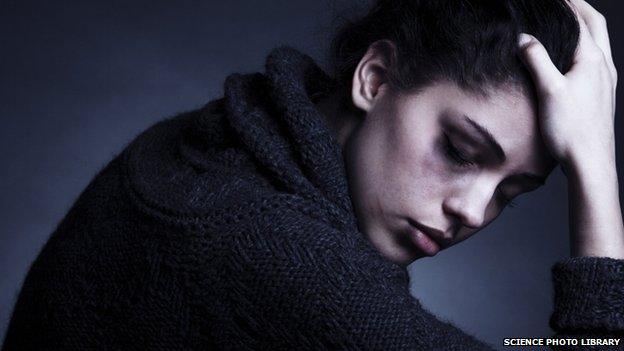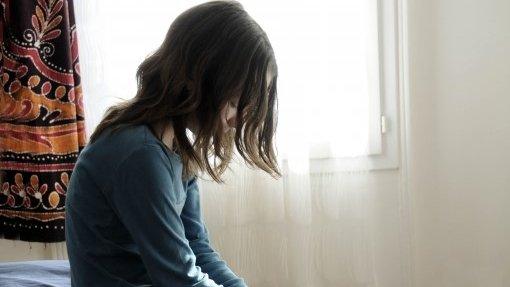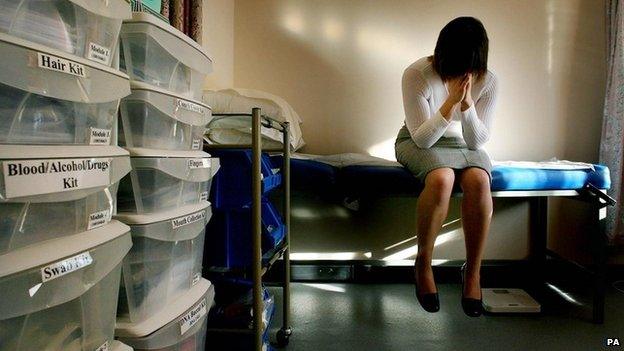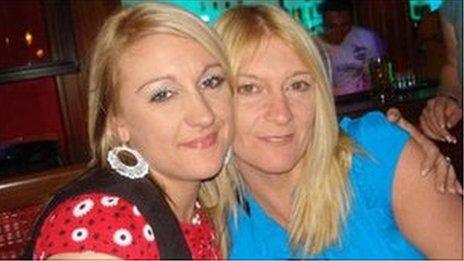Record number of prosecutions for violence against women
- Published

A record number of people have been prosecuted for offences categorised as "violence against women and girls", figures for England and Wales show.
A Crown Prosecution Service (CPS) report, external showed more than 107,000 such prosecutions in the year to April, up 16,000 (18%) on the previous year.
The figures are for crimes "primarily" against women, but male victims are also included.
The statistics include cases of rape, domestic violence and "honour" crime.
In the report, prosecutors said a common theme was the use of the internet to contact potential victims and post indecent images and messages.
In one case, a man used social media chatrooms to groom vulnerable women and girls, before he later raped them.
In another, a man sent 700 messages, mostly of a threatening nature, to a woman he had met on a dating website, after she had failed to respond to one email.
Alison Saunders: "[The internet] may facilitate the crime but the evidence is there and we will use it"
The report also showed there were the highest ever number of convictions for domestic abuse (68,601), sexual offences (7,591), honour-based violence (129) and child abuse (7,469).
There is no specific offence of honour-based violence, but it is used by the CPS to describe offences including domestic and sexual violence within families or social groups to "protect perceived cultural and religious beliefs and/or honour".
The number of rape convictions was also its highest ever (2,581), but the conviction rate for rape fell to 57%.
Prosecutions for stalking and harassment - many cases of which come under the CPS's definition of domestic violence, external - rose by 15% to more than 12,000.
Of these, 1,103 prosecutions were brought for new stalking offences, introduced in 2012.

Analysis

By Danny Shaw, BBC home affairs correspondent
More prosecutions and more convictions are chiefly, it appears, a result of more victims having the confidence to come forward.
But the increase may also be due to the growing use of the internet, which acts as an enabler of crime.
Prosecutors believe it's a common theme in many cases, from the paedophile grooming girls online to the stalker sending threatening messages.
The "plus" side of this sinister new phenomenon is that online activity leaves digital traces which can be used by police as evidence.
Nevertheless, the CPS is revising some of its guidance so that prosecutors make the best use of the law to tackle cyber-facilitated abuse and violence.
They'll be reminded, for example, that restraining orders, which are used to prevent victims being harassed in the real world, can also be applied online to stop offenders posting or replying to messages to their victims.

Director of public prosecutions, Alison Saunders, said violence against women and girls had "traditionally" been under-reported, but improvements by police and prosecutors had given more people the "confidence to come forward".
She said prosecutors had reported a rise in historical child sexual abuse cases and complex rape cases.
Of the fall in the number of rape convictions, she said the CPS was bringing "the right, although often the more difficult, cases to court".
The CPS's Violence Against Women and Girls strategy, introduced in 2007-08, records statistics for domestic violence, forced marriage, honour-based violence, female genital mutilation, rape and sexual offences, prostitution, trafficking, child abuse and pornography.
Zoe Dronfield describes the eight-hour attack that nearly killed her
Campaigners have welcomed the report.
Polly Neate, chief executive of Women's Aid, said the figures showed "significant progress" had been made in taking domestic violence cases to court.
"This progress must continue until we have a system where women who experience domestic violence have exactly the same level of confidence as victims of other crimes, that they are heard and believed, the system works for them and protects their human right to live free from violence," she said.
Katie Russell, of Rape Crisis England and Wales, said there was still "some distance to travel" before all survivors of sexual violence and violence against women and girls receive the justice they want and deserve.
- Published17 June 2015

- Published6 June 2014

- Published22 May 2014
